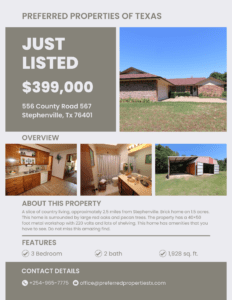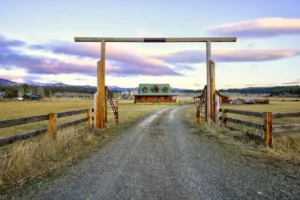 A Slice of Country Life, approx 2.5miles from Stephenville. A spacious brick home set on 1.5 acres. The front of the home is lined with large Red Oaks and Pecan trees. Property has a metal workshop appx 40×50 feet with 220 electrical power and tons of shelving. Covered parking attached, perfect for RV or boat. A great dog kennel set-up. The gardener is sure to appreciate the fenced Garden with water and fruit trees. This beautiful home has a large living room with a lovely brick fireplace, as well as an open formal dining area. The galley-style kitchen is equipped with built-in appliances and plenty of cabinets. A bright Breakfast Nook, for eat-in kitchen dining. Large Utility room with storage, shelving and space for a freezer or extra refrigerator. Split bedroom arrangement. The large primary bedroom features a walk in wardrobe, a double vanity bath, and a walk in shower. Additional bath has tub and shower combo for the two additional bedroom. This home is full of amenities that you must see. Please don’t miss out on this super great find.
A Slice of Country Life, approx 2.5miles from Stephenville. A spacious brick home set on 1.5 acres. The front of the home is lined with large Red Oaks and Pecan trees. Property has a metal workshop appx 40×50 feet with 220 electrical power and tons of shelving. Covered parking attached, perfect for RV or boat. A great dog kennel set-up. The gardener is sure to appreciate the fenced Garden with water and fruit trees. This beautiful home has a large living room with a lovely brick fireplace, as well as an open formal dining area. The galley-style kitchen is equipped with built-in appliances and plenty of cabinets. A bright Breakfast Nook, for eat-in kitchen dining. Large Utility room with storage, shelving and space for a freezer or extra refrigerator. Split bedroom arrangement. The large primary bedroom features a walk in wardrobe, a double vanity bath, and a walk in shower. Additional bath has tub and shower combo for the two additional bedroom. This home is full of amenities that you must see. Please don’t miss out on this super great find.
Why Ranch Ownership Could Be Your Next Great Investment
Are you considering investing in a ranch? Owning a ranch can be an excellent way to diversify your investment portfolio, while creating a source of income. Owning a ranch is a great investment because it offers many benefits. Ranch ownership is a great investment for many reasons, from increased property values to sustainability.
The Financial Benefits of Ranch Owning
Many people may think that investing in a cattle ranch is a luxury they can’t afford. The financial benefits that come with owning a farm may make it more feasible than you think.
Owning a farm can be a great investment. Your land’s value will increase over time, especially if improvements are made, such as adding a barn or fencing.
You can expect a significant return on investment if you decide to sell the ranch at a later date. Renting out your ranch to farmers and ranchers can be a great way to earn a regular income. Your property may be suitable for farming or livestock grazing, which will generate a steady income stream without you having to do much work.
Ranches can be an excellent investment. You may be able deduct expenses associated with land ownership depending on your circumstances. This includes property taxes, mortgage interests, and even maintenance costs.
Ranch ownership is a great way to diversify your portfolio. Land is an tangible asset that can retain its value during economic downturns.
Owning a ranch has many financial benefits. These include potential appreciation, ongoing income streams, and tax deductions. It’s vital to consider all your options and to work with professionals who are experienced to ensure you make a wise investment.
Tax Benefits for Ranch Ownership
The potential tax benefits of owning land, and a ranch in particular, are one of the many advantages. You may be eligible for various tax credits and deductions depending on the way you use your property.
You can deduct several expenses if you own a ranch. You can deduct any costs related to the management of your property. This includes repairs, maintenance and utilities. You may also be able claim a deduction if you use the land you own for agricultural purposes such as raising animals or growing crops.
A ranch can also provide tax benefits by claiming conservation easements. These easements are agreements which limit the use or development of a property to protect wildlife habitat or natural resources. You may receive a significant tax deduction by donating a conservation agreement. This will preserve your land for future generations.
If you sell your ranch you may qualify for a special tax incentive known as a “1031 exchange”. You can defer capital gains tax on the sale of a property by reinvesting the proceeds into another piece of realty within a specified timeframe.
Ranch ownership offers significant tax advantages. Consult a tax expert to make sure you are taking full advantage of the credits and deductions available. You can enjoy the lifestyle and conservation benefits while maximizing the financial benefits.
Welcome to the team, Chance!
Chance Pack from Dream Home Lending in Stephenville, TX is committed to providing the best home loan solutions for his customers.
Chance has been with us for just a few months, but has already made a significant impact in our office. He is incredibly knowledgeable about the mortgage industry, and is always willing to go the extra mile to help his clients. Born and raised in Texas, Chance is a graduate of Tarleton State University and is a certified Construction and Divorce lender.
Chance comes to us with a wealth of experience in the mortgage industry. He has worked as a mortgage lender for many years, and has a deep understanding of the different types of mortgages available and the lending process. He is a highly motivated and results-oriented individual with a strong work ethic.
I am confident that Chance will continue to be a valuable asset to our team. He is a talented mortgage lender, and is also a great team player. We are proud to have him in our office.
If you are looking for a mortgage lender, We highly recommend Chance Pack. He is professional, knowledgeable, and dedicated to helping his clients achieve their dream of homeownership.
How Much Should A Down Payment Be?
 Saving for a down payment is a major part of buying a house. The down payment you make when you sign a mortgage is your down payment. Lenders often refer to down payments as percentages.
Saving for a down payment is a major part of buying a house. The down payment you make when you sign a mortgage is your down payment. Lenders often refer to down payments as percentages.
The down payment is what you own initially when you purchase a house. Your lender will cover the rest.
The standard is usually referred to by 20% but is this the truth?
You may feel that a 20% deposit is too high for you to afford, but is it really?
Considerations to consider when making a down payment
What are the Benefits of 20% down?
There are benefits to putting down 20%.
You don’t need to purchase private mortgage insurance, or PMI. The PMI protects your lender in the event that you default on your loan.
Your lender may agree to cancel PMI if you do not put down 20% but reach a certain level of equity.
The higher the deposit you make on your mortgage, the lower the rate of interest you will get.
The higher the down payment you make, the lower the risk you are to a lender, and the better the terms you’re likely get.
You could save thousands over the course of the loan if you put down 20%, and got an interest rate two points lower. The bigger your down payment, the smaller the monthly payment.
The real estate market is still competitive despite COVID-19’s economic downturn. A larger down payment will also make you look more attractive to sellers.
It’s important to buy in a market that is hot.
The downsides of putting 20% down
There are some downsides of a higher down payment.
You’re also taking on more financial risks. This can be scary for some buyers, as they will have less money in an emergency fund to cover any unexpected events. If you don’t save enough money, it will be difficult to pay for repairs and updates. It could also take many years to save up 20% of the purchase price.
Can you buy a home without a down payment?
You can buy a house without a down payment if you use a government-backed mortgage. These loans are insured by the federal government, which makes them less risky for lenders.
VA loans and USDA loans are two of the most popular government backed loans without a down payment. VA loans are for service members, veterans and some surviving spouses. USDA loans are available to buyers who qualify in suburban and rural areas.
What is the difference between a personal loan and a business loan?
The type of loan that you are likely to receive is crucial when deciding how much down payment you will need.
The down payment requirement for a conventional loan on a primary home is left up to the lender. Some lenders may require as little as 3 % down payment, for instance. Some lenders offer lower down payments for qualified borrowers.
A minimum credit score of 580 is required to qualify for an FHA loan. If your credit score falls below 580, you will need to pay at least 10%.
This means that for buyers, there are both advantages and disadvantages to the traditional 20% deposit guideline. It’s important to determine what is best for your finances and shop around for the loans that are most suitable for you. You don’t have to give up your dream of owning a house if you can’t make the 20% down payment.
Original Blog: https://realtytimes.com/archives/item/1040895-how-much-should-a-down-payment-be?rtmpage=
Join Our Team Today!
 Are you looking for a rewarding career in real estate? If so, we invite you to join our team! We are a successful real estate brokerage with a strong reputation for excellence. We offer our agents comprehensive training, support, and resources to help them succeed. We also have a strong referral network that can help our agents reach a wider audience.
Are you looking for a rewarding career in real estate? If so, we invite you to join our team! We are a successful real estate brokerage with a strong reputation for excellence. We offer our agents comprehensive training, support, and resources to help them succeed. We also have a strong referral network that can help our agents reach a wider audience.
Careers (preferredpropertiestx.com)
Whose Water is it Anyway? Understand Your Rights
 During your first visit, you shouldn’t just focus on the physical land that you are looking to buy. A large water reserve could be hidden under the surface, and this can have a significant impact on the value of your land as well as the way that you will use it if you purchase. Water rights are often sold or leased separately, sometimes for very large sums of cash. The rights to these natural resources are therefore more attractive to investors.
During your first visit, you shouldn’t just focus on the physical land that you are looking to buy. A large water reserve could be hidden under the surface, and this can have a significant impact on the value of your land as well as the way that you will use it if you purchase. Water rights are often sold or leased separately, sometimes for very large sums of cash. The rights to these natural resources are therefore more attractive to investors.
Surface water and groundwater are the two types of water which affect landowners. Surface water (such as a stream or pond) is classified above ground. Groundwater, on the other hand, is found below ground. Your interests as a potential landowner may lie further below the surface.
The majority of drinking water is derived from wells and springs. Therefore, groundwater should be considered when purchasing land. Surface water and groundwater both have different rights that you should be aware of before signing any purchase agreements.
Without professional guidance, landowners may have trouble understanding water rights. In every region, there is a complex interaction of federal, state and municipal laws. It can take a lot of time to navigate the details and stay compliant with the laws.
Learn the Basics
Water rights are not ownership of the water, but rather authorization to use it in a certain way. The key is how water is being used. The laws vary greatly because each state has different weather conditions, and different ideologies about the use of water. Some states treat surface and groundwater the same, giving landowners greater freedom to use water in their own way. States that are drier and more susceptible to droughts have stricter laws. Landowners are required to seek the approval of the state government to exercise their right to water.
Water is not all created equal. Senior water rights and Junior water rights exist. Water is first granted to the senior water right. The next senior water right follows. The most junior rights can be denied when water is scarce or disputed. Bob Regester of Mossy Oak Properties Colorado Mountain Realty, Divide, Colorado noted that appropriation dates before 1900 are senior and those after 1900 junior.
The date on which an owner receives water rights is called the appropriation. Other users of water must respect the rights of the initial appropriator.
In states with water scarcity, especially those in the West, the division of rights between surface and groundwater is also more strictly regulated.
Regester said that in most cases, when the land contains surface water, water rights aren’t available, as they are usually owned by multiple municipalities across several states. You may not divert or dam a stream, or use it to build your home. You can only fish, wade and let your animals drink water from the stream.
You can find out what water rights are associated with the land that you’re considering buying by performing a title search in your county. If necessary, you can also speak to a state official directly. A prospective buyer, just like with mineral rights should get as much information about water rights as possible to make sure that the seller has the right to it. You can get help from a professional in this regard, since water rights are often abandoned on land.
Water Rights During a Sale
You’ll need to ensure that all water rights are fully disclosed when you buy land. Water rights can be sold as part of a land sale or separately.
Regester noted that three types of deeds can be used for the conveyance water rights. These are a general warranty, a special guarantee, and a quitclaim deed. Water that was deemed to have a more recent appropriation date by a court (the date that it was put to its first beneficial use as decreed) will be more valuable, and therefore more expensive.
Land buyers should also look into drilling rights. Certain wells are drilled with close supervision by the state. Wells with higher water levels are more valuable. According to Regester, in some areas like Colorado, drillers are 90 percent successful at hitting water.
You can determine the extent of your rights by familiarizing yourself with past well production. Land brokers can provide you with information on neighboring properties, allowing you to see what other property owners do with their water rights. You can be more confident about your decision to complete the deal in which the water rights are immediately transferred.
Regester said that it is crucial for buyers to verify the well production rate of nearby properties with existing wells. If a buyer plans to purchase a property that has a well on it, they should test the water quality and production rate.
Respecting Water Rights
The West is at a crossroads in terms of water supply and demand. The importance of water rights is not to be underestimated, particularly since it is our most valuable resource. Not knowing your rights can lead to a decrease in the value of the land you own, as well as causing problems with the state. It can also cause health issues.
Even if your water is pure and safe, it’s still important to test regularly. This will establish a record for water quality. The water should be checked for excessive contamination, and the presence of minerals. If water is too contaminated, it will not be useful if it’s not cleaned and chlorinated.
It is important to know your local laws, and that you use your water in compliance with them.
A Mossy Oak Properties Certified Land Specialist will help you to understand your water rights and how to obtain them. Water attorneys and municipal regulators can provide additional assistance.
Original Blog: https://www.landthink.com/whose-water-is-it-anyway-understand-your-rights/


